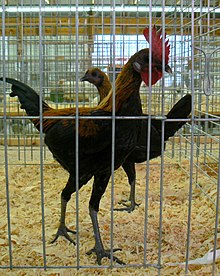Modern Game
 A brown-red pair | |
| Conservation status | |
|---|---|
| Country of origin | United Kingdom |
| Traits | |
| Weight | |
| Classification | |
| APA | all other standard breeds[5] |
| EE | yes[6] |
| PCGB | hard feather[7] |
| |
The Modern Game is a British breed of ornamental chicken which originated in England between 1850 and 1900.[8]: 62 It was bred from gamecock stock, but solely as an exhibition bird.
History

Cockfighting was made illegal in Britain in 1849; in the following decades, some breeders cross-bred fighting birds of Old English Game and Malay stock to develop an ornamental bird for exhibition.[9]: 131
This was initially known as the Game, and in 1865 was included in nine colours in the Standard of Excellence in Exhibition Poultry, the first edition of the British Poultry Standard by William Bernhardt Tegetmeier;[10]: 20 a Game bantam was also listed.[10]: 47 From about 1870 it was known as the Exhibition Game or Exhibition Modern Game.[11]: 204 [12] Eight colours were included in the first edition of the Standard of Perfection of the American Poultry Association in 1874.[5]
Characteristics
The Modern Game is tall and upright, with a long neck and long legs. The body is broad at the breast and tapers towards the tail, somewhat like a clothes iron in shape; the back is short and flat. Thirteen colours are recognised by the Poultry Club of Great Britain: birchen, black, black-red, blue, blue-red, brown-red, gold duckwing, lemon-blue, pile, silver-blue, silver duckwing, wheaten and white.[11]: 204 The colour of the beak and legs varies according to that of the plumage, from black in the birchen through willow-green in the duckwings and the black-red to yellow in the pile and white. The comb is single and small; the face, comb and wattles vary from black though deep purple to a bright red, and the eyes also vary from black to bright red.[11]: 204
Standard-sized cocks weigh 3.20–4.10 kg and hens 2.25–3.20 kg,[4]: 185 while bantams weigh 570–620 g and 450–510 g respectively.[4]: 186
Use
The Modern Game does not lay well, nor is it valued for meat production. It is kept almost exclusively for showing, particularly in the bantam size.[8]: 62 [11]: 208
References
- ^ Barbara Rischkowsky, D. Pilling (eds.) (2007). List of breeds documented in the Global Databank for Animal Genetic Resources, annex to The State of the World's Animal Genetic Resources for Food and Agriculture. Rome: Food and Agriculture Organization of the United Nations. ISBN 9789251057629. Accessed August 2014.
- ^ Watchlist 2023–24. Kenilworth, Warwickshire: Rare Breeds Survival Trust. Archived 16 March 2024.
- ^ Modern Game Chicken. Pittsboro, North Carolina: The Livestock Conservancy. Archived 23 August 2023.
- ^ a b c d Victoria Roberts (2008). British poultry standards: complete specifications and judging points of all standardized breeds and varieties of poultry as compiled by the specialist breed clubs and recognised by the Poultry Club of Great Britain. Oxford: Blackwell. ISBN 9781405156424.
- ^ a b APA Recognized Breeds and Varieties: As of January 1, 2012. American Poultry Association. Archived 4 November 2017.
- ^ Liste des races et variétés homologuée dans les pays EE (28.04.2013). Entente Européenne d’Aviculture et de Cuniculture. Archived 16 June 2013.
- ^ Breed Classification. Poultry Club of Great Britain. Archived 12 June 2018.
- ^ a b Jeremy Hobson, Cecilia Lewis (2009). Choosing & Raising Chickens: The complete guide to breeds and welfare. Newton Abbot: David & Charles. ISBN 9780715333105.
- ^ Carol Ekarius (2007). Storey's Illustrated Guide to Poultry Breeds. North Adams, Massachusetts: Storey Publishing. ISBN 9781580176675.
- ^ a b William Bernhard Tegetmeier (editor) (1865). The Standard of Excellence in Exhibition Poultry, authorized by the Poultry Club. London: Poultry Club.
- ^ a b c d J. Ian H. Allonby, Philippe B. Wilson (editors) (2018). British Poultry Standards: complete specifications and judging points of all standardized breeds and varieties of poultry as compiled by the specialist breed clubs and recognised by the Poultry Club of Great Britain, seventh edition. Chichester; Hoboken, New Jersey: Wiley Blackwell. ISBN 9781119509141.
- ^ Modern Game. Kenilworth, Warwickshire: Rare Breeds Survival Trust. Archived 20 May 2022.
Further reading
- Joseph Batty (1999 [1976]). Understanding Modern Game, fifth edition. Midhurst, West Sussex: Beech Publishing House. ISBN 9781857363135.
